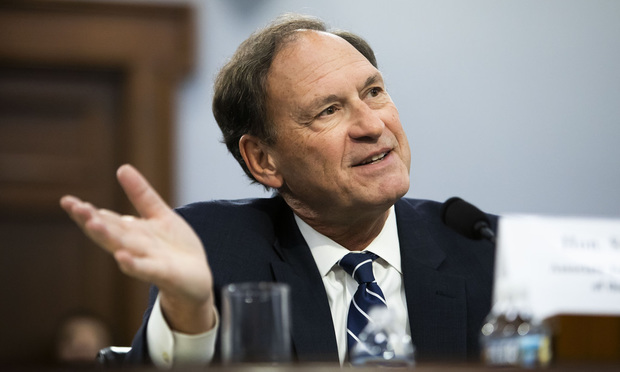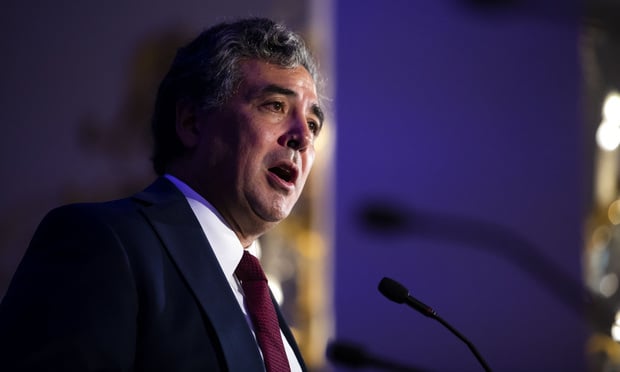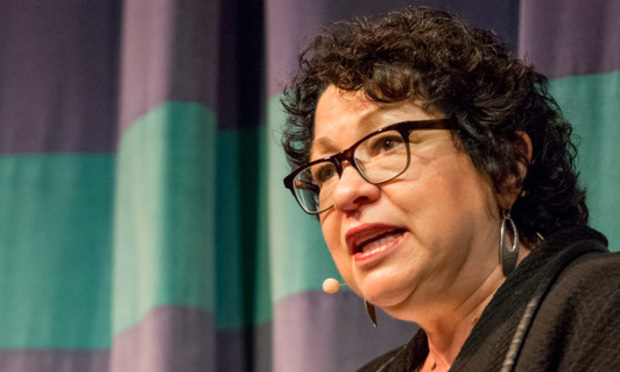'Wheezy' Roberts, Breyer's 8th Grade Lesson, and Alito Cuts to the Chase: SCOTUS Laugh Lines
Supreme Court arguments are serious business. But there are lighter moments. Here's a look at some of the lines from justices and advocates that brought laughter.
December 31, 2019 at 01:20 PM
8 minute read
 U.S. Supreme Court building on, April 23, 2019.
U.S. Supreme Court building on, April 23, 2019.
U.S. Supreme Court cases are serious business, to be sure, but even the most significant challenge offers opportunities for the justices—and advocates—to employ their own unique brand of humor.
Here's a look at some of the lines from justices and advocates that drew laughter this past year.
>> "I'm getting wheezy."
(Rodriguez v. FDIC, argued Dec. 3)
U.S. assistant solicitor general Michael Huston: I agree that that rule of—you would not put a thumb on the scale where the parties have a contract.
Justice Neil Gorsuch: Okay.
Huston: As we have always—
Justice Brett Kavanaugh: Is that a yes?
Gorsuch: All right. That's a lot of words.
Kavanaugh: Is that a yes?
Gorsuch: It's wrong. We got that. Okay.
Kavanaugh: Did you say—you said yes, though?
Gorsuch: He said it's wrong. So if that's the case, counsel—He said it's wrong. I'm not letting him off the hook so fast.
Kavanaugh: No, I'm trying to keep him on.
Chief Justice John Roberts Jr.: I'm getting wheezy with this back and forth. To be clear—
Gorsuch: Let me just—
Roberts: Is your answer to Justice Gorsuch's question, yes or no?
>> "Old habits are hard to break."
(Ritzen Group v. Jackson Masonry, argued Nov. 13)
Justice Stephen Breyer: Maybe you want to say something extra about why this is final.
Roberts: And if you do, I apologize for interrupting your two minutes opening, so I at least will not ask a question for the next two minutes.
Griffin Dunham of Nashville, Tennessee's Dunham Hildebrand: No, your honor.
Breyer: Nor will I, because I had those two.
Roberts: Old habits are hard to break. I apologize.
Dunham: Your honor, for the court's edification, I waive my right for any of the two minutes. It's better—
Roberts: I anticipated that's what you were doing.
 Justice Alito testifying in 2019. Photo: Diego M. Radzinschi/ALM
Justice Alito testifying in 2019. Photo: Diego M. Radzinschi/ALM>> "I'd like to know what's really going on here."
(Financial Oversight and Management Board for Puerto Rico v. Aurelius Investment, argued Oct. 15)
Justice Samuel Alito Jr.: Mr. Olson, are you and your client here just to defend the integrity of the Constitution, or would one be excessively cynical to think that something else is involved here involving money? And, if so, what is it? What did the board do that hurt your client?
[Alito and Ted Olson of Gibson, Dunn & Crutcher went back and forth for a moment.]
Alito: I mean, you don't have to answer this if you don't want to, but there is no money issue involved here?
Olson: Of course, there—of course
Alito: Well, what is it?
Olson: There's over—
Alito: I'd just like to know what—this is a real case. I'd like to know what's really going on here.
Olson: Well, there's over $100 billion of indebtedness being adjudicated in various procedures, a lot of which is—
Alito: Right, and your client wants more of it, and somebody else you think is getting too much. So what is it exactly?
>> "It's like ethics and Aristotle."
(Kahler v. Kansas, argued Oct. 7)
Breyer; I mean, it's quite deep, this question. It's like ethics and Aristotle. The wind blew my hand. You don't hold him … well, I'll save my depth for later.
Roberts: Finish your question.
Breyer: I'm not sure I want to.
>> "We'll have further questions."
(Bostock v. Clayton County, Georgia, argued Oct. 8)
After only two questions and brief silence from the bench, Stanford Law School's Pamela Karlan said: Well, if no one has any further questions, I'll reserve the remainder of my time for rebuttal.
Roberts: Well, I think we'll have further questions.
 U.S. Solicitor General Noel Francisco. Photo: Diego M. Radzinschi / NLJ
U.S. Solicitor General Noel Francisco. Photo: Diego M. Radzinschi / NLJ>> "I don't think it's that close."
(R.G. and G.R. Harris Funeral Homes v. EEOC, argued Oct. 8)
U.S. Solicitor General Noel Francisco: I'd like to make three basic points aimed at basically addressing Justice Gorsuch's comment that this is a close textual case. And I would like to respectfully argue that I don't think it's that close for three reasons.
Gorsuch: Oh, neither side ever thinks a case is close. Judges always do, don't they?
>> "We don't usually take cases that have such limited application."
(Kansas v. Garcia, argued Oct. 16)
Gorsuch: Then why shouldn't we DIG [dismiss as improvidently granted] this case? I mean, if this is about a one-off prosecution that has no chance of recurring ever again, and, you know, I mean, I know you're vigorously defending your client, but we don't usually take cases that have such limited application.
Paul Hughes of McDermott Will & Emery, for the defendant: We would perfectly welcome a DIG, your honor. I think that would be an appropriate outcome in this case.
Gorsuch: Touche.
 U.S. Supreme Court Justice Antonin Scalia. Photo: Diego M. Radzinschi/NLJ
U.S. Supreme Court Justice Antonin Scalia. Photo: Diego M. Radzinschi/NLJ>> "He's turning over in his grave."
(Rotkiske v. Klemm, argued Oct. 16)
Shay Dvoretzky of Jones Day: Justice Ginsburg, the court—and it pains me to say this—Justice Scalia, were not—have not always been precise in their use of this terminology, but where it has mattered—
Justice Sonia Sotomayor: He's turning over in his grave hearing that.
Sotomayor added: Battle wordsmith.
>> "The answer is yes."
(CITGO Asphalt Refining v. Frescati Shipping, argued Nov. 5)
Alito: Well, if we thought that the text was perfectly ambiguous, couldn't we say we are incredibly smart people, and we think that the better rule is the Gilmore and Black rule?
Thomas Goldstein of Goldstein & Russell: Justice Alito, I learned a long time ago that if the question is could the Supreme Court do X, the answer is yes.
>> "I learned in the 8th grade."
Breyer: But, look, I learned in the eighth grade, and it may be wrong, that water does run downhill—and that virtually every little drop of rain that falls finds its way to the sea.
(County of Maui v. Hawaii Wildlife Fund, argued Nov. 6)
 Justice Sonia Sotomayor. Photo: Jason Doiy/ ALM
Justice Sonia Sotomayor. Photo: Jason Doiy/ ALM>> "We've done a lot worse."
(Comcast v. National Ass. of African American-Owned Media, argued Nov. 13)
Sotomayor: The worst thing we could possibly do is to try to describe a pleading standard on the basis of McDonnell Douglas or PriceWaterhouse, which were trial burdens or summary judgment burdens.
Roberts: I hesitate to say something is the worst thing we could do. But—
Sotomayor: No, you're right. We've done a lot worse.
Read more:
'Crisis of Credibility,' Write Tighter, Precedent Questioned: SCOTUS in 2019
'Laughter Is a Blood Sport' at the Supreme Court, Scholars Say in New Study
How to Tell a Justice They're Wrong
Say Your Piece, Supreme Court Advocates. But Only for Two Minutes
This content has been archived. It is available through our partners, LexisNexis® and Bloomberg Law.
To view this content, please continue to their sites.
Not a Lexis Subscriber?
Subscribe Now
Not a Bloomberg Law Subscriber?
Subscribe Now
NOT FOR REPRINT
© 2025 ALM Global, LLC, All Rights Reserved. Request academic re-use from www.copyright.com. All other uses, submit a request to [email protected]. For more information visit Asset & Logo Licensing.
You Might Like
View All
Apple Files Appeal to DC Circuit Aiming to Intervene in Google Search Monopoly Case
3 minute read

DC Circuit Revives Firefighters' Religious Freedom Litigation in Facial Hair Policy Row
3 minute read
DC Judge Chutkan Allows Jenner's $8M Unpaid Legal Fees Lawsuit to Proceed Against Sierra Leone
3 minute readLaw Firms Mentioned
Trending Stories
- 1Law Firms Expand Scope of Immigration Expertise, Amid Blitz of Trump Orders
- 2Latest Boutique Combination in Florida Continues Am Law 200 Merger Activity
- 3Sarno da Costa D’Aniello Maceri LLC Announces Addition of New Office in Eatontown, NJ, and Named Partner
- 4Friday Newspaper
- 5Public Notices/Calendars
Who Got The Work
J. Brugh Lower of Gibbons has entered an appearance for industrial equipment supplier Devco Corporation in a pending trademark infringement lawsuit. The suit, accusing the defendant of selling knock-off Graco products, was filed Dec. 18 in New Jersey District Court by Rivkin Radler on behalf of Graco Inc. and Graco Minnesota. The case, assigned to U.S. District Judge Zahid N. Quraishi, is 3:24-cv-11294, Graco Inc. et al v. Devco Corporation.
Who Got The Work
Rebecca Maller-Stein and Kent A. Yalowitz of Arnold & Porter Kaye Scholer have entered their appearances for Hanaco Venture Capital and its executives, Lior Prosor and David Frankel, in a pending securities lawsuit. The action, filed on Dec. 24 in New York Southern District Court by Zell, Aron & Co. on behalf of Goldeneye Advisors, accuses the defendants of negligently and fraudulently managing the plaintiff's $1 million investment. The case, assigned to U.S. District Judge Vernon S. Broderick, is 1:24-cv-09918, Goldeneye Advisors, LLC v. Hanaco Venture Capital, Ltd. et al.
Who Got The Work
Attorneys from A&O Shearman has stepped in as defense counsel for Toronto-Dominion Bank and other defendants in a pending securities class action. The suit, filed Dec. 11 in New York Southern District Court by Bleichmar Fonti & Auld, accuses the defendants of concealing the bank's 'pervasive' deficiencies in regards to its compliance with the Bank Secrecy Act and the quality of its anti-money laundering controls. The case, assigned to U.S. District Judge Arun Subramanian, is 1:24-cv-09445, Gonzalez v. The Toronto-Dominion Bank et al.
Who Got The Work
Crown Castle International, a Pennsylvania company providing shared communications infrastructure, has turned to Luke D. Wolf of Gordon Rees Scully Mansukhani to fend off a pending breach-of-contract lawsuit. The court action, filed Nov. 25 in Michigan Eastern District Court by Hooper Hathaway PC on behalf of The Town Residences LLC, accuses Crown Castle of failing to transfer approximately $30,000 in utility payments from T-Mobile in breach of a roof-top lease and assignment agreement. The case, assigned to U.S. District Judge Susan K. Declercq, is 2:24-cv-13131, The Town Residences LLC v. T-Mobile US, Inc. et al.
Who Got The Work
Wilfred P. Coronato and Daniel M. Schwartz of McCarter & English have stepped in as defense counsel to Electrolux Home Products Inc. in a pending product liability lawsuit. The court action, filed Nov. 26 in New York Eastern District Court by Poulos Lopiccolo PC and Nagel Rice LLP on behalf of David Stern, alleges that the defendant's refrigerators’ drawers and shelving repeatedly break and fall apart within months after purchase. The case, assigned to U.S. District Judge Joan M. Azrack, is 2:24-cv-08204, Stern v. Electrolux Home Products, Inc.
Featured Firms
Law Offices of Gary Martin Hays & Associates, P.C.
(470) 294-1674
Law Offices of Mark E. Salomone
(857) 444-6468
Smith & Hassler
(713) 739-1250








